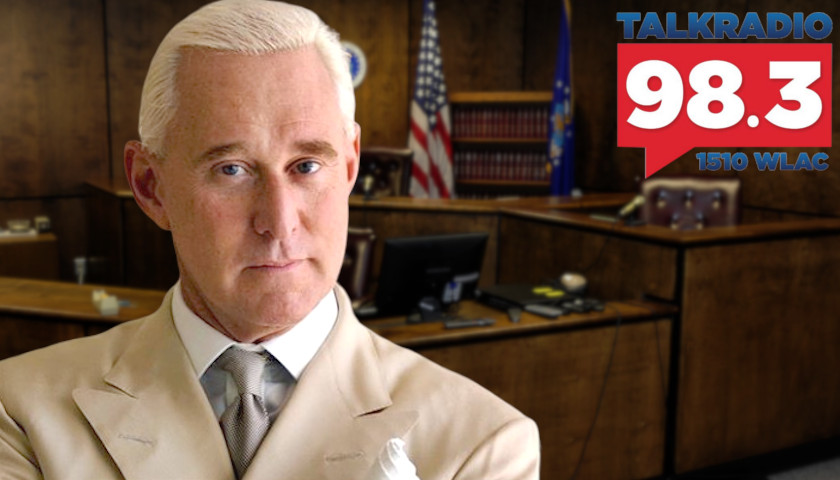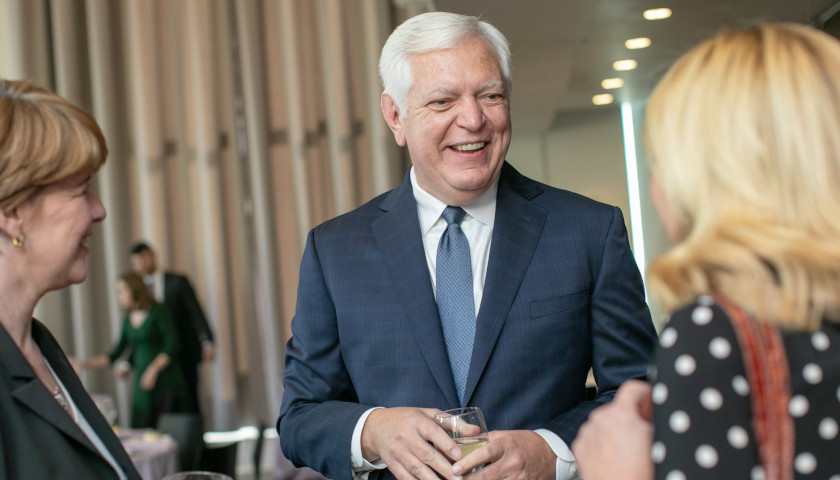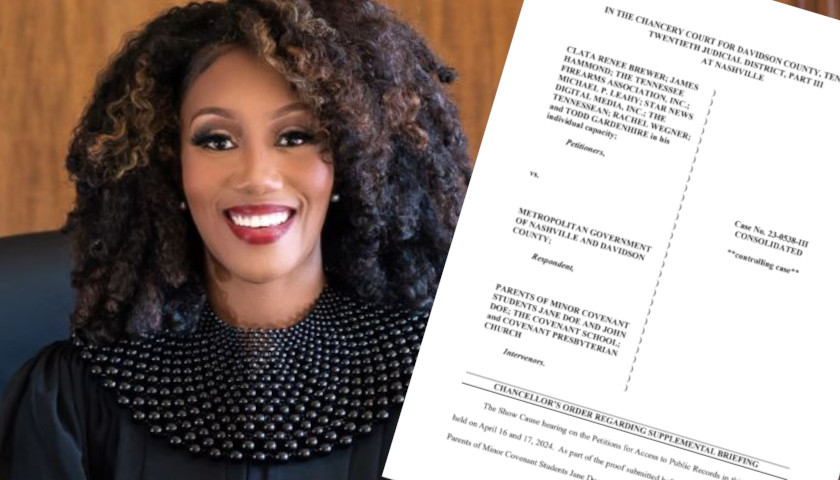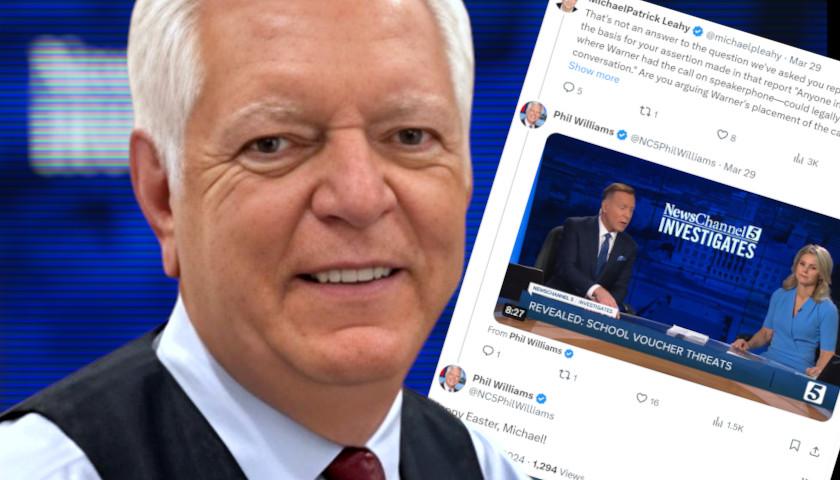On Friday’s Tennessee Star Report with Michael Patrick Leahy – broadcast on Nashville’s Talk Radio 98.3 and 1510 WLAC weekdays from 5:00 a.m. to 8:00 a.m. – all-star panelist Crom Carmichael weighed in on the DOJ and the dynamics of the Roger Stone trial.
During the second hour of the show, Carmichael explained how the jury foreman in the trial of Roger Stone was a leftist attorney working for the Bill and Melinda Gates Foundation in Washington, D.C. who lied under oath about her knowledge of the case. Nearing the end of the segment he affirmed that this is what defines “the swamp.”
Leahy: The original all-star panelist Crom Carmichael. Good morning Crom!
Carmichael: Good morning Michael. How are you, sir?
Leahy: Great. Hey, I want to thank both you and Ben Cunningham on Wednesday for holding down the fort while I was on business in Atlanta. I listened to almost the entire program. I got it on 1510 Am. The AM side of the signal as I was driving through rush hour traffic in Atlanta. That was just a delight!
Carmichael: You could pick that up in Atlanta on 1510 AM?
Leahy: Yes. It wasn’t quite as clear as 98.3. I could hear it all the way in Atlanta before 10 miles to my destination in Buckhead.
Carmichael: Wow. Interesting.
Leahy: But it was good. You guys did a great job.
Carmichael: So you’re saying that the 1510 AM can be picked up in Chattanooga?
Leahy: It’s picked up in Chattanooga and Atlanta and North Carolina. The AM signal, because it’s on that nighttime signal until the morning…
Carmichael: Go it.
Leahy: It depends on the season of the year. We have callers who listen on AM radio.
Carmichael: OK.
Leahy: Truck drivers in North Carolina and all around. Because when I come on the air at 5:00 a.m. in the morning, it’s still basically that nighttime ionosphere going on.
Carmichael: Sure, got it. Interesting.
Leahy: It was a clear channel station. 50,000 watts. One of the 25 or so that was set up back in the 1920s. And you would hear in the evening because of the bouncing off of the ionosphere the signal could be heard pretty much all across the eastern half of the United States. And that’s still the case. But it is an AM signal. So it’s not quite the clarity of the FM signal that we have on 98.3.
Carmichael: OK.
Leahy: You guys did a great job. So much going on. I wanted to talk with you a little bit Crom about this story you sent me about John Kelly the former Chief of Staff.
Carmichael: Yeah.
Leahy: He’s out there criticizing the President left and right. It seems like in very bad form to me.
Carmichael: Well, here’s what’s interesting. And I want to try to tie this into this, I don’t call how long Roger Stone is sentenced a kerfuffle. But Trump’s entering into the conversation, all of the criticism is a kerfuffle.
Leahy: I would agree completely.
Carmichael: Now, I also understand how William Barr says I don’t need you making my life more difficult by tweeting and creating a media storm where there shouldn’t be one. But, the question is the last part that I just said. Where there doesn’t need to be one. It is really sad to me that the interview that Barr did unless it was completely clipped, there were parts of it that weren’t covered at all. Or at least the parts that were shown.
Leahy: And let’s stop for a moment. I did not see the interview.
Carmichael: OK.
Leahy: But everybody in the country has seen one element of the interview.
Carmichael: One part of the interview. And I’ve not seen the whole interview. I’ve seen some clips. But the clips that I saw had one section. That I’ve heard Barr talk about, not necessarily in that interview, but talk about more elements of this particular case. And here’s what’s important. There were four prosecutors who resigned.
Leahy: Yes.
Carmichael: Who made their recommendation. Their recommendation. Let me be clear about that. This is not the recommendation that those four people made to Barr. They might have discussed it with Barr. But the recommendation that was supposed to be made to the court was fundamentally different than the recommendation that those four people did make to the court.
Leahy: Let’s go back. This is getting a little bit into the weeds, but I think it’s important.
Carmichael: It is super important.
Leahy: I understand that.
Carmichael: This is the question about insubordination when we talk about John Kelly.
Leahy: By the way, John Kelly in my mind…
Carmichael: Let’s stick with this, it gets to that too.
Leahy: So let’stalk about this a bit. So it’s a little bit difficult to understand the process within the DOJ. Let me lay this understanding out on it. So there was a prosecution team that prosecuted Roger Stone.
Carmichael: Correct. In many ways by the way, improperly.
Leahy: Not only that. One element of that improper prosecution had to do with the lead juror.
Carmichael: Right.
Leahy: It was a woman who is a far-left activist who, I think her name is Tomeka Hart or something like that.
Carmichael: It doesn’t’ matter.
Leahy: She, in 2012, was living in Memphis. She was actually the chairwoman of the Memphis school board at the time.
Carmichael: OK.
Leahy: In 2012 she ran for Congress as a “further to the left” than Steve Cohen in the Democratic primary. And she’s an attorney. She subsequently moved to the Washington, D. C. area where she is…wait for it…an official with the Bill and Melinda Gates Foundation.
Carmichael: Wow.
Leahy: And she has spent the entire period of the Trump presidency tweeting and putting social media articles out there viciously criticizing President Trump. So this would be…
Carmichael: And Roger Stone.
Leahy: And Roger Stone. This would be a very far-left ideologue. And for some reason she was first, I don’t see how an attorney who knows that they are that far left and I don’t see how an attorney would present themselves to be a juror on a highly political case like this.
Carmicheal: Voir dire.
Leahy: Well, here’s the thing.
Carmichael: Under oath. This is what’s key Michael. This lady misrepresented herself under oath to very specific questions that she lied about. And the judge, and by the way, and it’s the judge who asks all the questions.
Leahy: In the voir dire.
Carmicheal: And the attorneys for both sides get to approve and comment on the questions before they’re asked.
Leahy: So let me continue on this because it gets to the fairness of the trial of Roger Stone. Who’s an odd duck. Let’s be honest about it. But here’s the thing, and attorneys can weigh in. We had an illustrator who did drawings for us in that trial of Roger Stone. And at the beginning of the process when you do the jury selection, there is something called voir dire which is where different attorneys can object to certain jurors.
Carmichael: No, you cannot. Not in this case.
Leahy: Not in this case?
Carmichael: The judge picks them all.
Leahy: I stand corrected.
Carmichael: The attorney’s don’t even get to ask questions. The judge asks all the questions. The attorneys get to chime in on what the questions will be before they’re asked. But the judge asks all the questions.
Leahy: OK. So walk me through this. So then you know much more about this.
Carmichael: That’s why I’m angrier than you are.
Leahy: Yes. Explain. So you read an article about how she was selected then?
Carmichael: Yes.
Leahy: So tell us how this biased juror who hates Donald Trump and hates Roger Stone got on the jury that convicted him?
Carmichael: The way I approach it Michael is all the adjectives and descriptions that you just said don’t matter to me. What matters to me is this person was called for jury duty.
Leahy: OK. I’m with you.
Carmichael: And then this person who is a lawyer was asked questions under oath.
Leahy: Do we know what those questions were?
Carmichael: I’m not going to be able to quote them exactly. They were questions like, is there anything that would bias you about such and such? Is there any information that would bias you about Roger Stone and whether or not he did these things? Her response was, I really haven’t been paying attention to the trial.
The point I’m trying to make here is during her voir dire she lied. Not just once. Over and over again to make herself appear to be unbiased and do justice. That’s what she did. Now, the judge then accepted her on the jury. The judge should now, based on knowing this as a jury person, and this turned out to be the foreman of the jury.
Leahy: This is not a very smart attorney or this an arrogant attorney.
Carmichael: She’s a very smart attorney in Washington, D.C. This get’s into what the swamp is.
Listen to the full second hour here:
– – –
Tune in weekdays from 5:00 – 8:00 am to the Tennessee Star Report with Michael Patrick Leahy on Talk Radio 98.3 FM WLAC 1510. Listen online at iHeart Radio.
Photo “Roger Stone” by Roger Stone.








